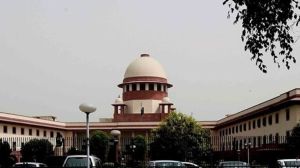Crisis makes Cong see reason: no free power
Hit by an unprecedented power shortage and pressure from the Centre, the Congress-led government in Maharashtra today decided to pull the pl...

Hit by an unprecedented power shortage and pressure from the Centre, the Congress-led government in Maharashtra today decided to pull the plug on the free power scheme it introduced in the run-up to the last Assembly polls.
Instead, 25 lakh farmers in the state will now be supplied power at subsidised rates. The decision takes effect from June 1.
‘‘Circumstances have forced us to take the decision,’’ said Chief Minister Vilasrao Deshmukh, adding, ‘‘The Cabinet has reached a consensus not to give anything free in future.’’ Deshmukh admitted that the scheme has resulted in wastage of power with farmers drawing excess water, which in turn caused groundwater tables to dip.
The scheme, introduced just before the Assembly elections in October 2004, was a poll plank for the ruling Congress-NCP combine in the face of rising anti-incumbency sentiment.
NCP chief Sharad Pawar had publicly criticised the sop from the outset.
Its impact on finances was considerable.
Till April 2004, the debt-ridden state had to pay Rs 1,722 crore to the MSEB to supply free power since the Maharashtra Electricity Regulatory Commission (MERC) does not allow the board to give subsidies or sops to any section unless the government pays for it.
Faced with a shortfall of over 3,500 MW and public resentment fuelled by the Opposition, the state had recently sought help from the Centre to resolve the crisis. Prime Minister Manmohan Singh, a strong critic of the scheme, had then asked the Maharashtra Government to scrap it to qualify for Central assistance.
Announcing the decision, Deshmukh insisted that by offering electricity at subsidised rates, ‘‘the government would continue to assist marginal farmers, who need it most.’’
There are over 25 lakh agricultural connections in the state and the government will pay MSEB about Rs 1,200 crore every year to compensate for the subsidy. Still, it will manage to save up to Rs 500 crore lost on the free power scheme. Plus check reckless use of electricity and water. ‘‘We want farmers to use both rationally,’’ said Deshmukh.
However, Opposition parties, Shiv Sena and BJP, are crying foul. ‘‘The government has cheated people. Sena will resort to a statewide agitation,’’ declared Sena leader Narayan Rane.
In a joint statement tonight, BJP leaders Pramod Mahajan and Gopinath Munde alleged that the government had tried to shift the blame for the electricity shortage on farmers and dared it to seek a fresh mandate. ‘‘They had won the election with a promise that farmers would be supplied free power,’’ the statement said. An urgent meeting of the state BJP has been called to chalk out the party’s future course of action.
Free power will now be replaced by two optional ways of paying electricity bills:
• If farmers decide to set up meters on their supply lines, rates would range from 20 paise per unit for up to 3 horsepower and 50 paise/unit beyond that.
• If the old pattern of calculating on the basis of horsepower (HP)—instead of meters—is used, it would be Rs 500 per HP for upto 3 HP, Rs 700/HP upto 5 HP and Rs 900/HP for over 5 HP.
Though costlier compared to the metered bill, the second method is being encouraged by the government so that it would help in energy audits, said Deshmukh.
The State Cabinet also cleared four new power projects today and allowed cooperative banks to invest money in MSEB’s energy projects. MSEB will install the facilities at its gas-based plant in Uran (for expansion to 1,040 MW), Talegaon-Dabhade (new gas-based unit of 1,400 MW), Khaparkheda (for expansion of thermal unit of 500 MW) and a pit-headed thermal project (where coal is available) in association with the Chhattisgarh board.



- 01
- 02
- 03
- 04
- 05




























